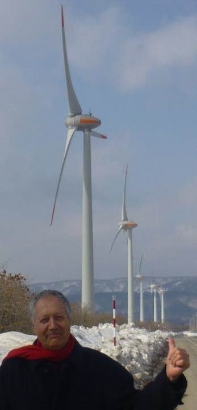Wind Power Polemics
In the early years of 'alternative technology' we fondly imagined that electricity could be adequately provided by small backyard devices of one kind or another. Eventually the brute physics and engineering proved that Big is essential even to get a basic supply. And finally the Big machines started to go up, in clusters known as 'wind farms'.
I was surprised to find that aesthetically, I didn't like them. At least in hilly countryside, they jarred with what I thought the landscape 'ought' to look like. In this respect I was no different from the archetypal Daily Telegraph reader horrified by the sudden appearance of industrial structures right in the middle of the 'view'. But once you have become convinced that Climate Change is a serious matter requiring a complete makeover of the energy system, aesthetic preferences have to take a back seat. The following article argues this out. It achieved a certain notoriety and was widely reprinted.
Why I hate Wind-farms and think there should be more of them 1995 (doc)
A few years later, partly as a result of my known views, I was invited to contribute a chapter for a special issue of a basically anti-wind environmental journal:
The Wind in My Sails 2002 (doc)
What often gets me going is the sheer hypocrisy of the well-heeled middle-classes consuming energy like there's no tomorrow (which there won't be if they carry on like they do) yet campaigning against a form of energy that happens to impinge on them rather than other people. An article in the magazine Resurgence provoked this reply:
A reply to a critic of wind farms 2004 (doc)
On another occasion I was invited to address a meeting of the Landscape Institute, which was chaired by the BBC's John Humphrys. John hates wind-farms and after my talk made some most unprofessional and ill-informed critical remarks. He invited the audience to demonstrate their rejection of my argument by a show of hands. The result was 80% in my favour.
I tackled John Humphrys in the bar afterwards. Why this intense animosity? His explanation was enlightening. He said that his job had given him a transcendent contempt for politicians: they never really meant what they said, but followed populist sentiment in order to maximise their hold on power. Populist sentiment will never allow the kinds of measures required to prevent climate change, therefore it's a done deal and it is ridiculous to make any sacrifices at all for what is essentially a lost cause. Argue your way out of that one!
Wind Farms and the Landscape 2006 (doc)
Much later I became involved in some of the wind-farm debates in mid-Wales, and tried to open up a dialogue with opponents. This was not entirely successful, as you can read in the controversies/wind-farms section of the site

